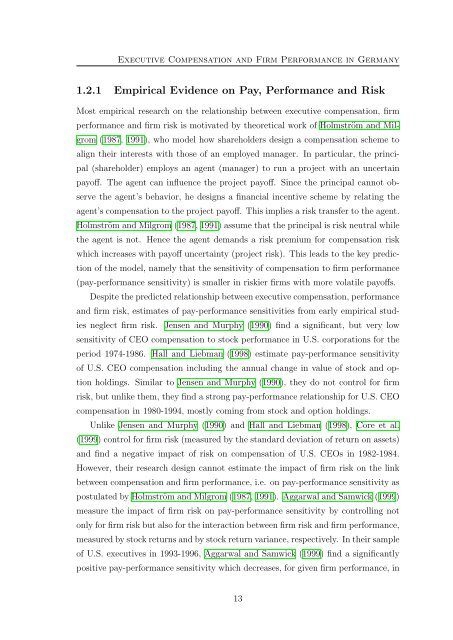Three Essays on Executive Compensation - KOPS - Universität ...
Three Essays on Executive Compensation - KOPS - Universität ...
Three Essays on Executive Compensation - KOPS - Universität ...
Create successful ePaper yourself
Turn your PDF publications into a flip-book with our unique Google optimized e-Paper software.
<strong>Executive</strong> Compensati<strong>on</strong> and Firm Performance in Germany<br />
1.2.1 Empirical Evidence <strong>on</strong> Pay, Performance and Risk<br />
Most empirical research <strong>on</strong> the relati<strong>on</strong>ship between executive compensati<strong>on</strong>, firm<br />
performance and firm risk is motivated by theoretical work of Holmström and Milgrom<br />
(1987, 1991), who model how shareholders design a compensati<strong>on</strong> scheme to<br />
align their interests with those of an employed manager. In particular, the principal<br />
(shareholder) employs an agent (manager) to run a project with an uncertain<br />
payoff. The agent can influence the project payoff. Since the principal cannot observe<br />
the agent’s behavior, he designs a financial incentive scheme by relating the<br />
agent’s compensati<strong>on</strong> to the project payoff. This implies a risk transfer to the agent.<br />
Holmström and Milgrom (1987, 1991) assume that the principal is risk neutral while<br />
the agent is not. Hence the agent demands a risk premium for compensati<strong>on</strong> risk<br />
which increases with payoff uncertainty (project risk). This leads to the key predicti<strong>on</strong><br />
of the model, namely that the sensitivity of compensati<strong>on</strong> to firm performance<br />
(pay-performance sensitivity) is smaller in riskier firms with more volatile payoffs.<br />
Despite the predicted relati<strong>on</strong>ship between executive compensati<strong>on</strong>, performance<br />
and firm risk, estimates of pay-performance sensitivities from early empirical studies<br />
neglect firm risk. Jensen and Murphy (1990) find a significant, but very low<br />
sensitivity of CEO compensati<strong>on</strong> to stock performance in U.S. corporati<strong>on</strong>s for the<br />
period 1974-1986. Hall and Liebman (1998) estimate pay-performance sensitivity<br />
of U.S. CEO compensati<strong>on</strong> including the annual change in value of stock and opti<strong>on</strong><br />
holdings. Similar to Jensen and Murphy (1990), they do not c<strong>on</strong>trol for firm<br />
risk, but unlike them, they find a str<strong>on</strong>g pay-performance relati<strong>on</strong>ship for U.S. CEO<br />
compensati<strong>on</strong> in 1980-1994, mostly coming from stock and opti<strong>on</strong> holdings.<br />
Unlike Jensen and Murphy (1990) and Hall and Liebman (1998), Core et al.<br />
(1999) c<strong>on</strong>trol for firm risk (measured by the standard deviati<strong>on</strong> of return <strong>on</strong> assets)<br />
and find a negative impact of risk <strong>on</strong> compensati<strong>on</strong> of U.S. CEOs in 1982-1984.<br />
However, their research design cannot estimate the impact of firm risk <strong>on</strong> the link<br />
between compensati<strong>on</strong> and firm performance, i.e. <strong>on</strong> pay-performance sensitivity as<br />
postulated by Holmström and Milgrom (1987, 1991). Aggarwal and Samwick (1999)<br />
measure the impact of firm risk <strong>on</strong> pay-performance sensitivity by c<strong>on</strong>trolling not<br />
<strong>on</strong>ly for firm risk but also for the interacti<strong>on</strong> between firm risk and firm performance,<br />
measured by stock returns and by stock return variance, respectively. In their sample<br />
of U.S. executives in 1993-1996, Aggarwal and Samwick (1999) find a significantly<br />
positive pay-performance sensitivity which decreases, for given firm performance, in<br />
13
















